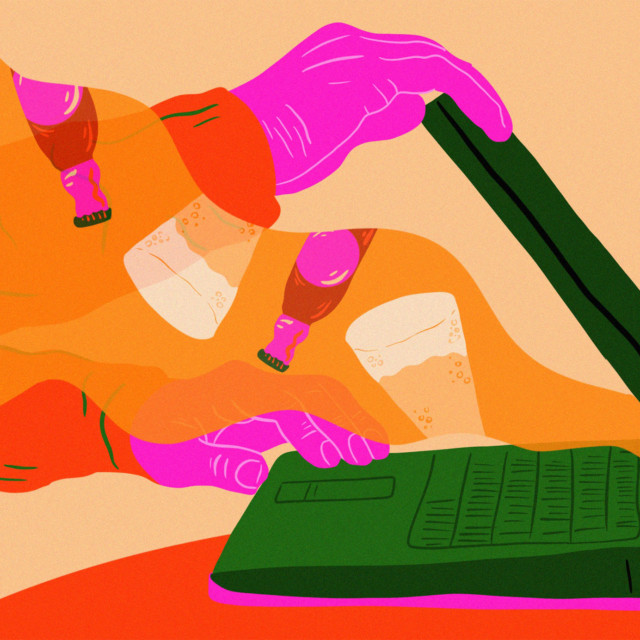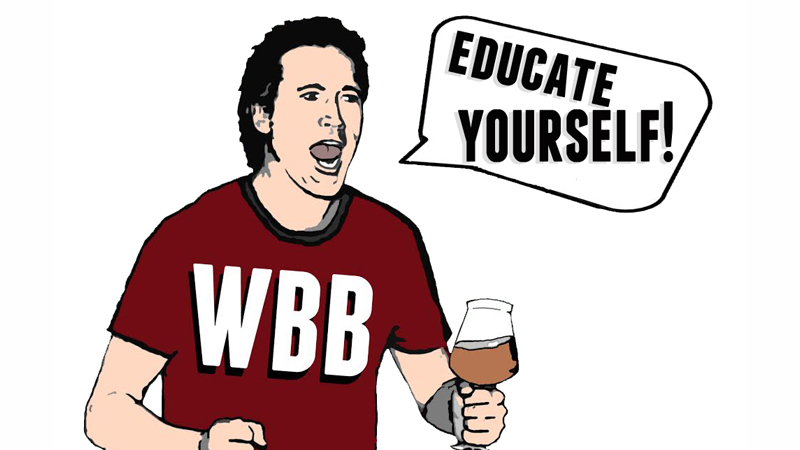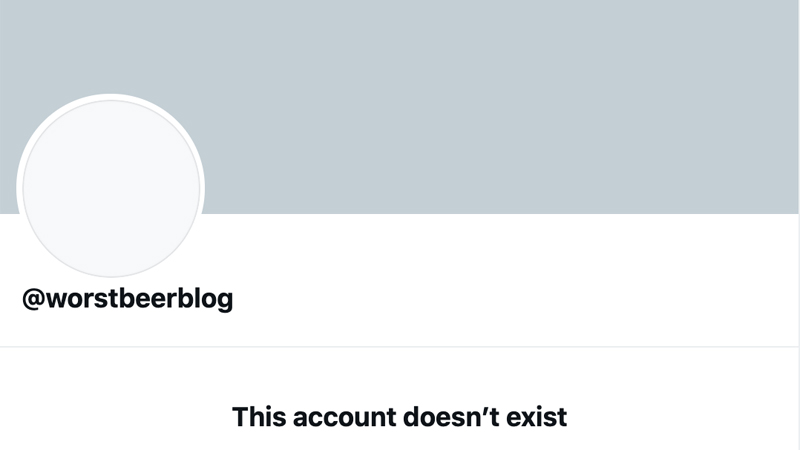Last winter I opened Twitter to a video of a man shooting a can of White Claw with a handgun.
“TAXATION IS THEFT,” said the guy. This is weird, said I. Sensing a story at hand, I messaged the account that had posted it. Its operator, who would identify himself only by the pseudonym Peter David, directed me to the source of the video, a now-defunct subreddit where gun rights types had elevated White Claw (and, to a lesser extent, all hard seltzers) to a near-talismanic status.
It was my first interaction with Worst Beer Blog, a set of prolific beer industry-focused social media accounts that functioned as a tabloid-cum-clearinghouse for the petty dramas and serious scandals that have, for better or worse, shaped contemporary craft beer culture online. With a unique mix of meme-inflected humor, deep understanding of the beer business, and an undeniable eye for news, “WBB” (as it was often shorthanded by brewery workers and others in the industry) kept beer drinkers and brewers alike on notice for the better part of the past decade.
Ending up on WBB — whether for shooting seltzers, putting out misogynistic beer labels, posting anti-mask screeds from your brewery’s official social handles, or whatever — was not where most members of the American craft beer community wanted to be. “[E]very beer industry employee fears either being on the page OR being a part of a brewery that did something to end up on the page,” said Antonio Sanchez, who operates Wort Wrangler, a popular Instagram account for beer industry workers.
“I do think [David] moved the needle with thousands of people, and made them a little more aware of what they were doing, and a little more thoughtful” in the beer industry, Doug Veliky, chief strategy officer at Chicago’s Revolution Brewing, told me in a recent phone interview. “There’s never been anything like it.”
And maybe there never will be again. A little over a year after our first exchange in the run-up to April Fools’ Day 2021, David (or whoever was operating the still-anonymous account at that point) tweeted “one like and I’ll delete my account.” Then he did exactly that, abruptly deactivating WBB on all platforms. The account’s tens of thousands of followers wondered if this was a set up for some elaborate prank, but April Fools’ Day came and went, and the accounts remained deactivated.
(I reached out to David through an intermediary requesting comment for this column, but he declined, saying, “I’ll be back someday doing something different but how about you guys leave me the f alone so I can miss you haha.”)
Whether David returns to social media, and in what capacity if so, remain open questions for now. But there’s no question that WBB made a mark on the online craft beer community in recent years. For proof, one need only check the beer-oriented corners of social media in his absence. As word of WBB’s departure spread, the industry’s very-online gadflies mourned with unusual earnestness on social media. Some swapped their avatars for the ones WBB had used: the Anheuser-Busch “A” logo on Twitter, the shouting cartoon face on Instagram. Others simply posted about how much they missed the accounts. (If memorializing the voluntary deactivation of an anonymous sh*tposter seems a little unhinged in the grand scheme of things, well, welcome to Beer Twitter.)
On Reddit, a post titled “RIP worst beer blog” garnered 100+ upvotes and nearly three dozen comments. “You gave me brief amounts of amusement while also enraging throngs of idiots at the same time … [w]hich is all I could ever ask for,” wrote the original poster.
“What I particularly enjoyed about the person who ran the account was their sense of humor when warranted, and the moral compass they always used in editorializing the content they chose to share,” Michael Graham, a co-owner of Austin Beerworks, told me via direct message. “They weren’t out to ruin people’s lives for the sake of internet points.”
It’s true that David didn’t seem to go in for the cancellation campaigns that animate prominent social media commentators in other industries. (He also, from what I saw, managed to avoid the temptation to use his anonymity as cover to post things that were cruel or false.) And though I never personally understood what energized him to wade into craft beer’s incessant culture-war bullsh*t, as a journalist covering the industry, I was grateful he did. WBB was a handy follow for monitoring and deciphering the American drinking public’s seething id, and interspersed with inside jokes and throwaway memes were leads on more serious, story-worthy stuff.
It was from a screenshot that WBB posted, for example, that I first learned about the union drive at Surly Brewing Co.’s Beer Hall last August. The same goes for the open letter Boulevard Brewing Co. employees posted criticizing that company’s handling of a sexual harassment scandal earlier this year. The hard seltzer shooting videos he found yielded this full-blown investigation into a heavily armed, boogaloo-oriented subreddit. And so on, and so forth.
In that way, David and WBB acted as something of an unofficial arbitrator for the national craft beer discourse. “I think that [WBB] provided a very critical platform for the examination of things that are unacceptable in the beer industry,” Alex Kidd, the creator behind Don’t Drink Beer, another popular account in the craft beer space, told me in a recent phone interview. “He gave people a platform to sound off against everything from racism, to sexism, to homophobia … without heavy-handedly becoming a pulpit or taking up arms, you know, in a way that would, could be seen as preachy.” (Though Worst Beer Blog once had an actual blog component where David would publish takes about the industry’s news of the day, on social media he’d lately kept captions anodyne and noncommittal, sometimes posting incendiary screenshots with nothing more than a popcorn or eyeball emoji.)
Such is the split legacy WBB leaves behind: one part craft beer gadfly sh*tposting for the lulz, one part social media muckraker putting the lie to the industry’s exceptionalism and self-mythology. Graham, from ABW, likened the account to the opening scene of “Blue Velvet”: “It showcased a dark side to an industry that likes to represent itself as a ’99 percent asshole-free,’ passion-driven, creative utopia,” he told me. Veliky, who posted a laudatory send-off for WBB, told me that the account may have made the craft beer business look worse than it actually was at times, but highlighted the industry’s room for improvement nonetheless. “There are plenty of knuckleheads in our industry doing dumb stuff every day, but there’s 25-to-1 good people,” he said. Of course, he acknowledged quickly, “that still leaves a lot of knuckleheads.”
Whether the account was good for the industry depends, I think, on what you expect of the industry. “WBB gave us, for better and for worse, a granular look at how we as an industry respond to the opportunity to make progress,” J Jackson-Beckham, Ph.D., principal at Crafted For All, a consulting firm that helps craft beverage firms develop inclusive business practices, told me via email. “At our best we engaged in thoughtful dialogue, demanded accountability, and sought to educate. At our worst, we held ourselves apart, as superior, and engaged in the kind of performative outrage that forecloses all but the narrowest possibility of growth or change.”
In my years following the account, I saw a lot more of the latter than the former. I’d occasionally dip into the comments below a controversial WBB post on Instagram and wonder to myself why anyone would subject themselves to that level of chaotic fury. Indeed, handling the toxic elements of the industry did seem to weigh on David. When I DM’d with him about the seltzer shooters, he told me he wanted to remain anonymous to avoid getting sued. This year, after shuttering the accounts, he posted a farewell message via an intermediary that alluded to the overwhelming experience of operating the account, and a concern that he wasn’t “qualified” for it:
As the publicist for #WorstBeerBlog, here is his official statement: pic.twitter.com/0Ai4BNvOs5
— Jemma Wilson (@JemWilson84) March 30, 2021
Don’t Drink Beers’ Kidd, who’s received criticism for his own support for causes like Black Lives Matter in the past, said WBB’s anonymity and limited commentary probably weren’t enough to exempt him from vitriol. “Even though he’s not presenting a position outright, or making [his account] a pulpit for editorializing … I can imagine he got a ton of negativity behind the scenes.”
He “set out to be a beer parody account and ended up being the confidant to people sharing some pretty horrific-sounding stories,” added Graham.
But if a sin-eater’s weariness led to WBB’s departure, the matter of the sins still remains. Anxiety about annihilation-by-acquisition loomed large throughout the industry back in 2013, when WBB hit Twitter, and the then popular David vs. Goliath paradigm made it easier to overlook the industry’s ills. But problems like labor exploitation, racism, and sexism were always there, and they still are. “He [was] just highlighting problems that exist,” said Kidd. “It’s not that, like, prior to Worst Beer Blog, the beer industry was fine.”
Nor after Worst Beer Blog, for that matter. So who will sift through the craft beer business’s social media dregs now that David has hung up the proverbial cleats? I hope someone. Actually, I hope everyone. (This seems like a good time to reiterate my inbox is always open for tips, by the way.) After all, if WBB’s life taught us anything, it’s that there’s no shortage of screenshots to post, controversial characters to scrutinize, and unsavory business practices deserving of sunlight’s bright glare. And if the account’s death taught us anything, it’s that no one can hope to post it all.
This story is a part of VP Pro, our free platform and newsletter for drinks industry professionals, covering wine, beer, liquor, and beyond. Sign up for VP Pro now!


